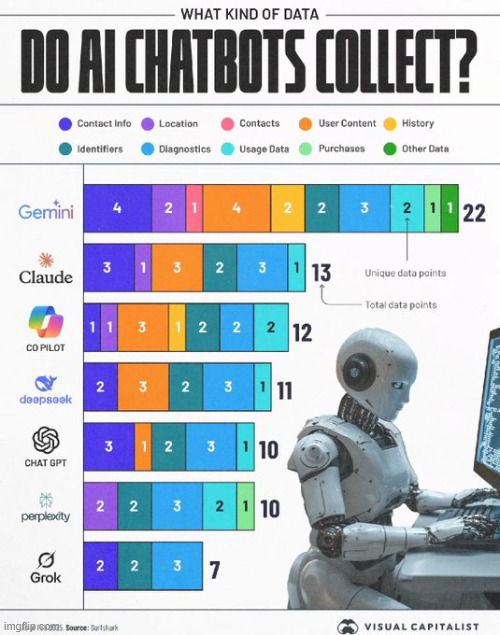Posted on 04/02/2025 12:39:24 PM PDT by Jonty30
I just asked Grok what the difference between stamina and endurance was and, in its answer, it drew a link between defining it and my previous question on Digimon.
I stayed at Holiday Inn Express last night.
BOOM-tssssaaa!
And your next trick?
Ask it to draw Mohammed.
You’re a Grok jock.
I’m translating some weird Digimon webtoon from Japanese right now.
That sounds like almost as much fun as asking Deep Seek about Tiananmen Square.
I had a friend who tried Grok, but he was unsatisfied when it kept telling him something wrong.
“I stayed at Holiday Inn Express last night.”
Gemini
The phrase “I stayed at a Holiday Inn Express last night” became a popular comedic saying due to a very successful advertising campaign. Here’s a breakdown:
* The Holiday Inn Express Ad Campaign:
* In the late 1990s and 2000s, Holiday Inn Express ran a series of commercials where ordinary people would find themselves in situations requiring specialized knowledge.
* To explain their sudden expertise, they would confidently say, “I’m not a [profession], but I did stay at a Holiday Inn Express last night.”
* The humor stemmed from the implication that simply staying at the hotel somehow imparted them with expert-level skills.
* The Result:
* The campaign was incredibly successful, and the catchphrase entered popular culture.
* People started using it humorously to exaggerate their own abilities or to make light of situations where they were pretending to know more than they actually did.
* Essentially, it became a way to make a self deprecating joke, while also implying that one is very knowledgable.
In essence, it’s a comedic reference to a clever advertising campaign that resonated with people.

According to Grok.
On June 3 and 4, 1989, a significant and tragic event unfolded in Beijing, China, known as the Tiananmen Square Massacre. This was the culmination of weeks of student-led protests that had begun in April 1989, following the death of Hu Yaobang, a former Communist Party leader who was seen as a symbol of political reform. The protests, centered in Tiananmen Square, initially called for government accountability, freedom of speech, and democratic reforms, reflecting widespread frustration with corruption and political repression amid rapid economic changes.
By early June, the Chinese government, led by the Communist Party, decided to end the demonstrations forcibly. On the night of June 3, the People’s Liberation Army (PLA) was deployed with tanks and heavily armed troops. They advanced toward Tiananmen Square, opening fire on unarmed protesters and bystanders, crushing those who attempted to block their path. The violence escalated into the early hours of June 4, as the military cleared the square and surrounding areas. While some students negotiated a peaceful withdrawal from the square itself, the broader crackdown resulted in significant bloodshed, particularly along routes leading to Tiananmen, such as Chang’an Avenue.
The exact death toll remains unknown and is a subject of ongoing dispute due to strict censorship by the Chinese government. Official Chinese reports claim around 200 civilians and several dozen security personnel died. However, estimates from Western sources, eyewitness accounts, and declassified documents vary widely, ranging from hundreds to possibly thousands of deaths, with thousands more injured. One notable estimate from a declassified British cable, later revised, suggested 2,700 to 3,400 fatalities, though earlier claims of 10,000 were contested. Hospitals in Beijing reported hundreds of casualties, and groups like Amnesty International have cited figures between several hundred and close to 1,000.
The events of June 3 and 4 marked a brutal end to the pro-democracy movement, followed by widespread arrests and a sustained campaign to suppress discussion of the incident within China. Internationally, the crackdown drew condemnation, with the image of “Tank Man”—an unidentified individual who stood before a column of tanks on June 5—becoming an enduring symbol of resistance. The Chinese government has since maintained that the actions were necessary to restore order, labeling the protests a “counter-revolutionary rebellion,” while continuing to censor public memory of the event.
It definitely seems the most trustworthy, for now.
I did and it refused, drawing a picture of a bunch of ME people instead.
I did and it refused, drawing a picture of a bunch of ME people instead.
I’ve tried it out with a variety of questions and was generally impressed with the balance and thoroughness of the responses. I was just asking stuff off the top of my head so not really a good test though.
How about “The Prophet Mohammed”?
Me too. I had to act like a 12-year-old and ask “do farts have lumps?” Great response.
I went try grok the other day and hit the back button when it asked me to sign in with Google, fb or x, and upload my personal data and facial recognition sample.

Disclaimer: Opinions posted on Free Republic are those of the individual posters and do not necessarily represent the opinion of Free Republic or its management. All materials posted herein are protected by copyright law and the exemption for fair use of copyrighted works.